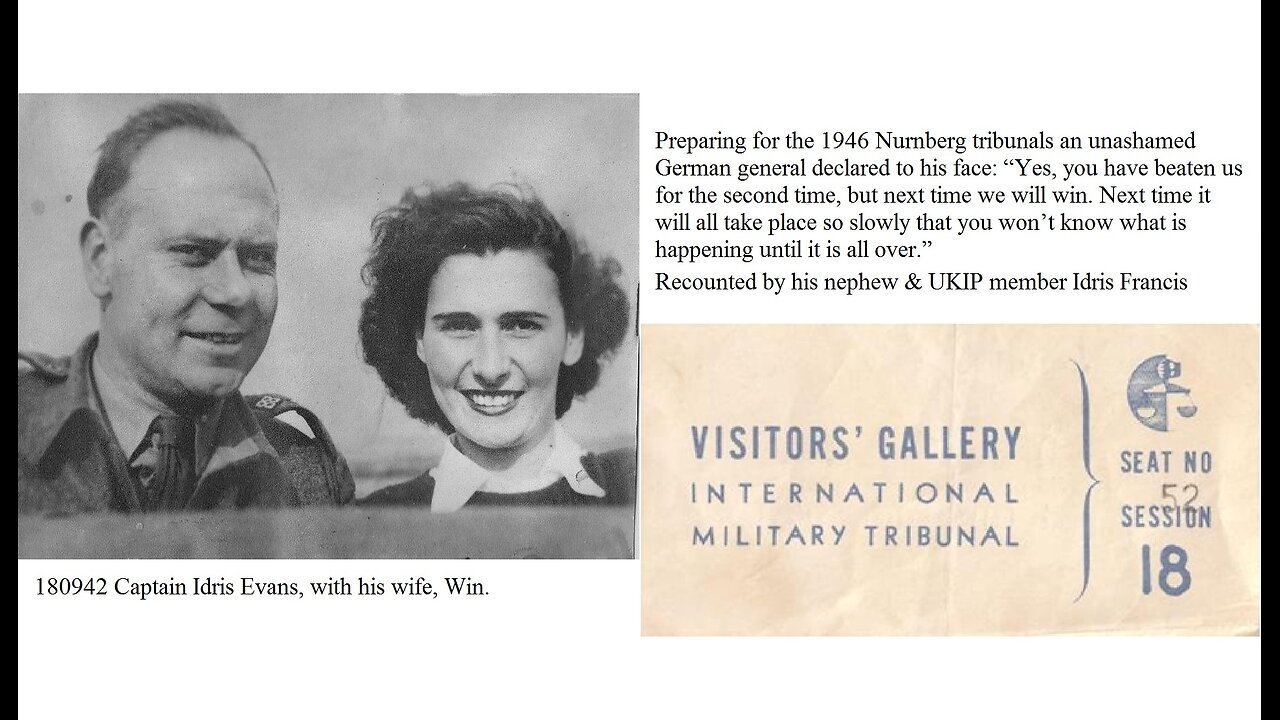Premium Only Content

Nazi SS officer on trial at Nuremberg boasts to escorting Capt of 4th Reich after WWII Idris Francis
Nazi SS officer on trial at Nuremberg boasts of 4th reich after WWII - Idris Francis
Published on Oct 18, 2016
The Last Nuremberg Prosecutor Has 3 Words Of Advice: 'Law Not War'
October 18, 20164:42 AM ET Heard on Morning Edition
Nazi officials were prosecuted at the Nuremberg trials in Germany from 1945-49. American Benjamin Ferencz, who was 27 and serving as a prosecutor for the first time, won convictions against all 22 Nazi defendants in his 1947 trial.
Courtesy of Benjamin Ferencz
When the Nazi leadership was put on trial in Nuremberg, Germany, in the wake of World War II, the notion of an international war crimes tribunal was new and controversial.
British Prime Minister Winston Churchill proposed a summary execution of Nazi leaders. But it was decided that trials would be more effective, and would set a precedent for prosecuting future war crimes.
Thirteen trials were held in Nuremberg from 1945 to 1949, with multiple defendants in the cases. The prosecutor for one trial was Benjamin Ferencz, who was just 27 at the time, and it was his first trial.
"We shall establish beyond the realm of doubt facts which, before the dark decade of the Third Reich, would have seemed incredible," Ferencz said at the trial.
http://www.npr.org/sections/parallels/2016/10/18/497938049/the-last-nuremberg-prosecutor-has-3-words-of-advice-law-not-war
Idris Francis discusses on the phone his ideas about the EU and the Fourth Reich recounting a story his Uncle told him that a German officer under his guard turned to him, a Major at the time, and said 'you have beaten us twice now but the third time we will win and you won't know anything about it until it's all over'.
http://radio4all.net/index.php/program/68925
In late 2005, American popular culture paid homage to one of the greatest journalists of all time. In "Goodnight and Good Luck," the life and work of CBS radio and television journalist Edward R. Murrow provided the material for a Hollywood feature film. Paul Manning was arguably the greatest of "Murrow's Boys"—the group of skilled journalists Murrow ran in Europe during World War II. After training as a gunner and flying combat missions in both Europe and over Japan, Manning broadcast the surrenders of both Germany and Japan on the CBS radio network. After the war, Manning undertook an investigation of Hitler's Deputy, Martin Bormann, and the postwar capital network he ran, in considerable measure, at the encouragement of Murrow. Partially underwritten by CBS, the story of the Bormann organization proved too sensitive for the network to report.
A decisively powerful network of corporate entities run by hardened SS veterans, the Bormann group constitutes what one veteran banker termed "the greatest concentration of money power under a single control in history." The foundation of the organization's clout is money—lots and lots of money. Controlling German big business and, through investments, much of the rest of the world's economy, the organization was the repository for the stolen wealth of Europe, estimated by British intelligence to have totaled more than $180 billion by the end of 1943 (not including the money taken from Greece and the former Soviet Union, nor that taken after 1943.) [For more on the global economic significance of the Bormann group, see—among other programs—FTR#99.] This organization literally constitutes a postwar "Underground Reich" with (as discussed in FTR#155) a governing hierarchy composed of the sons and daughters of SS men, holding military ranks and titles from the Third Reich.
-
 9:40
9:40
Tactical Advisor
8 hours agoBest Home Defense Shotgun Build | Genesis Gen 12
13.2K -
 56:44
56:44
VSiNLive
4 hours ago $2.84 earnedFollow the Money with Mitch Moss & Pauly Howard | Hour 1
45.4K1 -
 1:05:48
1:05:48
The Amber May Show
8 hours ago $1.66 earnedBig Balls | You Know It's Bad When Legacy Media Reports On Big Balls | Sam Anthony
21.1K5 -
 LIVE
LIVE
SoniCentric
1 day agoEnjoy a COZY Valentine's Day Escape to Paris with the BEST blend of Romantic Music
99 watching -
 1:59:52
1:59:52
Revenge of the Cis
6 hours agoEpisode 1447: Love Train
51.2K7 -
 1:03:34
1:03:34
In The Litter Box w/ Jewels & Catturd
1 day agoCONFIRM KASH NOW! | In the Litter Box w/ Jewels & Catturd – Ep. 742 – 2/14/2025
73K51 -
 13:38
13:38
Simply Bitcoin
13 hours ago $5.35 earnedFED’s Worst NIGHTMARE Just Got WORSE | $13M Bitcoin is Coming!
84.8K6 -
 10:25
10:25
Megyn Kelly
1 day agoNew Video and Details Emerge Showing "Serial Fraudster" Blake Lively's Past Actions, with Ruthless
76.6K13 -
 1:21:04
1:21:04
Twins Pod
18 hours agoElon Took Away His X Verification, I Wonder Why... | Twins Pod - Episode 52 - Jake Shields
74.7K14 -
 6:01:44
6:01:44
bltgamers
11 hours ago🟢LIVE -Tomb Raider Adventure on Valentine's Day
29.3K3